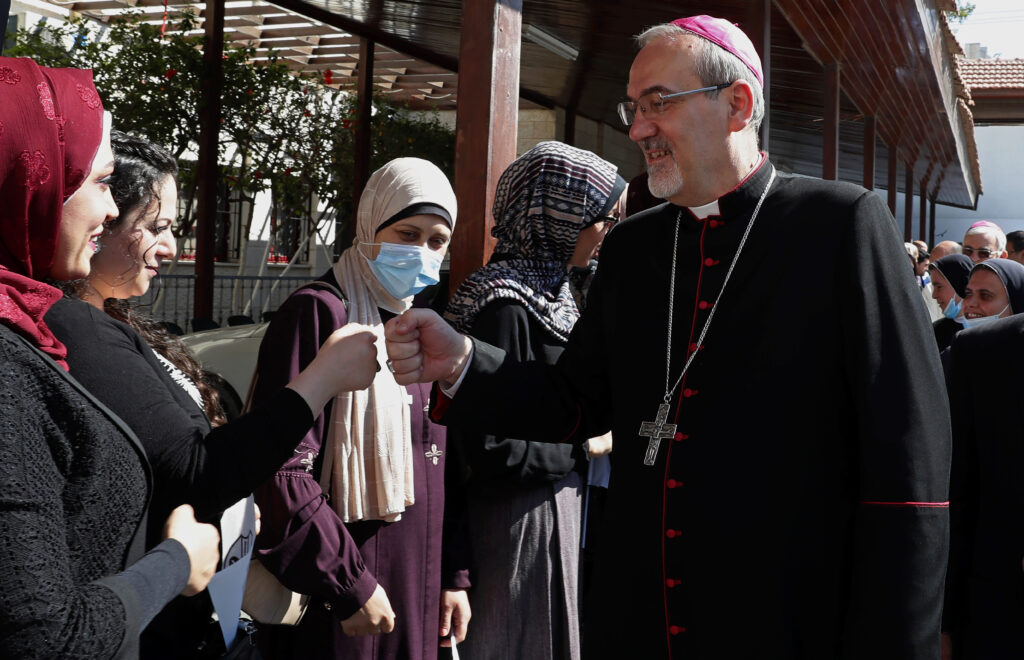The Dark Horse Candidate for Pope Who Could Repair — or Ravage — Relations Between Israel and the Vatican
The Latin Patriarch speaks Hebrew and lands at Rome as the high-profile prelate in the Promised Land.

The Latin Patriarch of Jerusalem, Pierbattista Cardinal Pizzaballa, who speaks fluent Hebrew, arrives for the papal conclave at Rome from the heart of the conflict between Israel and the Palestinian Arabs.
Cardinal Pizzaballa, who is 60 years old, comes to the Eternal City after a period of tension between the Jewish state and the former pontiff, Pope Francis. The 266th pope created the Italian as a cardinal, and in 2014 tasked him with organizing a prayer service with Presidents Abbas and Peres at the Vatican.
Francis, though, was widely seen as sympathetic to the cause of the Palestinian Arabs. At the Nativity Scene and Christmas Tree Inauguration at St. Peter’s Basilica in December he prayed before a display of the Christ child attired in a kafiyeh. Earlier in the year he wrote that “according to some experts, what is happening in Gaza has the characteristics of a genocide.” Francis did condemn antisemitism on Easter, just hours before he died.
Israel appeared to respond to the pontiff’s death in a muted fashion. Prime Minister Netanyahu’s office waited four days to issue condolences. Only the Jewish state’s ambassador to the Vatican attended his funeral, rather than a higher-level diplomat. When Pope John Paul II died in 2005, Israel sent its then-president, Moshe Katzav, and its foreign minister, Silvan Shalom.
The day Francis died the Israeli Foreign Ministry posted to X a prayer that “his memory be for a blessing.” That was quickly deleted. Neither the Hebrew-language account for Mr. Netanyahu’s office nor the premier’s personal account offered condolences. In January, a papal aide speaking on behalf of the Bishop of Rome called the situation at Gaza “very serious and shameful.”
On October 16, 2023, a little more than a week after Hamas’s attacks on southern Israel, Cardinal Pizzaballa made an extraordinary suggestion — that he himself be exchanged for Israeli children taken hostage at Gaza. Reuters relates that he said: “I am ready for an exchange, anything, if this can lead to freedom, to bring the children home. No problem. There is total willingness on my part.” He added: “You can’t talk to Hamas. It is very difficult.”

The cardinal serves the some 300,000 Catholics who live in Israel, the West Bank, Gaza, Jordan, and Cyprus. The Latin Patriarchy, whose seat is the Church of the Holy Sepulchre, was created in 1099 of the common era after the conquests of the First Crusade called by Pope Urban II. In 1096, Crusaders massacred Jews along the Rhine river, including at Speyer, Worms, and Mainz.
Cardinal Pizzaballa, who taught Biblical Hebrew at a Franciscan academy at Jerusalem, is the first non-Arab Patriarch in three decades. He has been critical of the Palestinian Arab propensity to blame Israel for every jot and tittle of their misfortune, once quipping: “If the weather isn’t good, the cause is the occupation.”
The cardinal, though, has also on occasion been critical of Israel. He protested the construction of the security wall at the West Bank in response to waves of terror attacks, and at Christmas at Bethlehem said of the Palestinian Arabs: “Though living on their own land, they continually hear ‘there is no place for them.’ For decades they have been waiting for the international community to find solutions to end the occupation.”
After Francis died, Cardinal Pizzaballa told reporters that “Gaza represents, a little bit, all what was the heart of his pontificate” and that the late pontiff “was very close to the community of Gaza, the parish of Gaza, he kept calling them many times — for a certain period, also every day, every evening at 7 p.m.”
The Holy See recognized Israel only in 1993, 45 years after the founding of the Jewish state. Some saw in that delay the legacy of millennia of antisemitic sentiment and theology. During the Holocaust, Pope Pius XII famously kept silent about the fate of Europe’s Jews even though evidence suggests that he knew of the plans for extermination. In 1965 Vatican II yielded “Nostra Aetate,” which repudiated antisemitism.
That same year, Pope John XXIII, who had died in 1963, was quoted by the Catholic Herald as having said that the Church is “conscious today that many many centuries of blindness have cloaked our eyes so that we can no longer either see the beauty of Thy Chosen People nor recognize in their faces the features of our privileged brethren.”
The former pope had added: “We realize that the mark of Cain stands upon our foreheads. Across the centuries our brother Abel has lain in the blood which we drew. … Forgive us for the curse we falsely attached to their name as Jews. Forgive us for crucifying Thee a second time in their flesh. For we know not what we did.”
The Catholic church, though it has diplomatic relations with Jerusalem, has eschewed affirmation of the theological significance of the Jewish claim to the land and the existence of the state of Israel. Popes Paul VI, John Paul II, Benedict XVI, and Francis have all visited Israel. Prime Minister Sharon liked to tell of his visit to Pope John Paul II, who remarked that while Israel was the Holy Land to Jews and Christians, it was only promised to the Jews.
The Online Betting Guide gives Cardinal Pizzaballa odds of 7/1 to be the next Bishop of Rome, which translates to a 12.5 percent chance. Only four prelates of the 135 who are eligible are seen as more likely to sit the throne of St. Peter.
______________
Correction: Pope John XXIII made the comments reported in 1965 about the historical “blindness” of the Catholic Church. An earlier version misstated the source of the comments.

